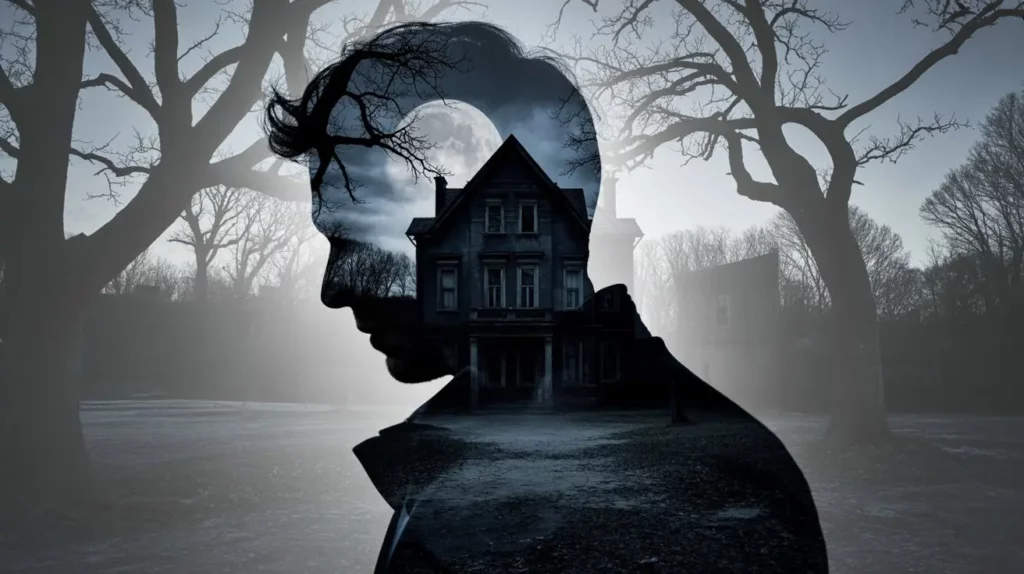
In the best psychological thrillers, the danger isn’t just what someone does—it’s what someone believes. It’s the choice whether to trust, the quiet unraveling of perception and paradigm, the moment a character realizes everything they knew was a lie.
If you’re drawn to psychological thriller books, character-driven suspense, and mind-bending thrillers, you know the pull of stories that don’t just twist perspectives. These stories make us question what’s real, what’s imagined, and how fragile certainty can be.
What Makes a Thriller Psychological?
When we think of thrillers, we often imagine ticking clocks, shadowy figures, or dramatic escapes. But the true power of a psychological thriller lies beneath the surface—in emotion, memory, and motive.
The most gripping suspense grows not from explosions, but from self-doubt. The danger lives in the mind, where fear and trust do battle.
In An Abrupt Departure, Graham Hall expects an ordinary junk-removal job but finds an apartment frozen in time—passports, photos, and medication left behind. What he finds sends chills down his spine: personal items like family photos, passports, and essential medication that no one would leave behind willingly. As he digs deeper into the job, he uncovers a hidden journal filled with entries that suggest a growing threat.
In She Wore Mourning, Zachary Goldman, a private investigator living with PTSD and depression, navigates the death of a child while confronting his own demons of the past. The case forces him to put aside everything he believes about the case and start again without any preconceptions. He has to let go and look again at the who and the why.
These are stories of perception, truth, and vulnerability—thrillers where truth is psychological, not procedural.
Haunted Minds and Complex Heroes
Psychological thrillers often center on characters who live with trauma, grief, or neurodivergence. Their strength lies in emotional endurance and insight.
In Virtually Harmless, Micah—a brilliant, neurodivergent scientist and artist—finds herself drawn into a mystery that echoes her own history. Her unique way of seeing the world is not onlyb her greatest asset but also her biggest challenge.
In Tattooed Teardrops, Tamara faces the world after juvenile detention, trying to rebuild her life while overwhelmed by trauma and mistrust. Her struggle isn’t about conquering weakness—she is already stronger than she thinks. It is about discovering herself and her own beliefs and path forward. Shaking off the shackles of the past and ties that helped her survive in juvie and choosing her own direction.
The best character-driven thrillers understand that psychological complexity is not fragility. It’s resilience. It’s how people live with uncertainty, memory, and pain and keep going.
Portraying mental health and neurodivergence authentically matters. The best psychological thrillers illuminate what it means to live with fear, perception, and truth.
Truth Is Never Simple
In many thrillers, the final reveal ties everything up neatly. But in the psychological thriller, truth is less defined. Perception shifts. The end is not the end.
In An Abrupt Departure, even as Graham uncovers what happened in that abandoned apartment, he knows that Ashley’s and Ethan’s stories are not over and the past will continue to haunt them and Graham and Joiner too.
In She Wore Mourning, solving the case doesn’t heal the community—or Zachary. The trauma persists for all of them. That’s the essence of psychological suspense: it lingers. It makes us re-examine how we see our lives and social justice in the world.
Why We Keep Reading
- Empathy for imperfection. Readers connect with characters who live honestly with pain, rather than those who appear untouched by it.
- Mind over motion. The thrill comes from uncertainty and moral ambiguity, not from car chases or shootouts.
- Reality unsteady. When home, memory, or mind turns unreliable, every comfort becomes potential danger.
- Emotional catharsis. By watching others navigate fear and recovery, we explore our own resilience safely.
Read Next
Articles
👉 Small Town Secrets: Why Familiar Places Make the Scariest Thrillers
👉 Clean Psychological Thrillers: Heart-Pounding Suspense Without the Gore
👉 When Love Turns Dangerous: Obsession and Control in Psychological Thrillers
Frequently Asked Questions
Q: What makes a thriller psychological rather than action-driven?
A: A psychological thriller focuses on motive, emotion, and perception rather than physical danger. The real suspense comes from inside the characters’ minds.
Q: Why do readers love stories about the human mind?
A: Because they reveal what we all fear and hope for—to understand ourselves. These stories give us empathy, catharsis, and insight into what it means to endure uncertainty and survive it.
Q: What separates a psychological thriller from a mystery?
A: Mysteries focus on solving a puzzle—uncovering who did what. Psychological thrillers explore why people do what they do, delving into motive, perception, and moral conflict.
Q: Can a thriller be suspenseful without violence or gore?
A: Absolutely. The most gripping stories rely on emotional tension, ethical ambiguity, and fear born from empathy, not shock value.
Q: How can writers portray mental illness responsibly in fiction?
A: By researching conditions, avoiding stereotypes, and writing characters as full people—defined by choices and experiences, not diagnoses.
Q: What draws readers to complex, emotionally flawed protagonists?
A: Because imperfection feels authentic. Readers see themselves in characters who struggle, adapt, and grow stronger through adversity.
Q: Why do psychological thrillers stay with readers long after finishing?
A: Because they touch something primal—our need to understand trust, fear, and the fragile line between safety and danger.


